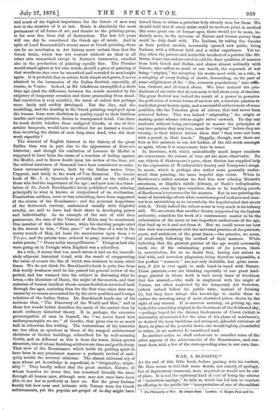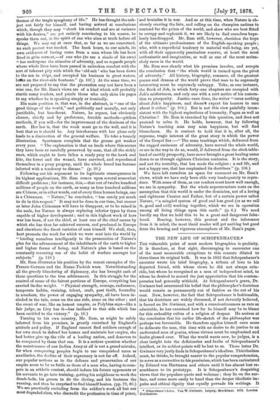WAR, A BLESSING.*
AT the end of this little book, before parting with his readers, Mr. Ram seems to feel that some words, not exactly of apology, but of deprecatory comment, were required or would not be out of place. It is not the equivocal kind of éclat of being the utterer of "hazardous sayings," be tells us, which has led him to venture on offering to the public his "interpretation of one of the saddest • The Philosophy of War. By James Rua. London : 0. Hagan Paul and 0. themes of the tragic symphony of life." He has thought the sub- ject out fairly for himself, and having arrived at conclusions which, though they may "shock his comfort and are at variance with his desires," are yet entirely convincing to his reason, he speaks them out, in the spirit of one who aims at truth before all things. We may say at once that, so far as we are concerned, no such protest was needed. The book bears, to our minds, its own evidences of having come from a man whose life has been lived in grim earnest,—of one who (to use a simile of his own) "has undergone the stimulus of adversity, and so regards people whose whole lives have been passed in unbroken comfort with the sort of tolerant pity with which the 'old salt' who has been down to the sea in ships, and occupied his business in great waters, lairs on the river-side boatman." (p. 107.) At the same time, we are not prepared to say that the precaution may not have been a wise one, for Mr. Ram's views are of a kind which will probably startle many readers, and puzzle those who only skim his pages to say whether he is speaking simply or ironically.
His main position is, that war, in the abstract, is "one of the good things of the world," and politically and morally, not only justifiable, but beneficent. Nature, he argues, has obviously chosen, chiefly and by preference, forcible methods—pitiless methods, if you will—for the improvement of the denizens of the earth. Her law is, that the weak must go to the wall, and it is best that so it should be. Any interference with her plans only leads to a diminution of the general welfare. To take a homely illustration. Sportsmen complain that the grouse get weaker every year. "The explanation is that on lands where this occurs they have been so carefully preserved by man, that all the sickly ones, which ought to have fallen a ready prey to the hawk and kite, the ferret and the weasel, have survived, and reproduced themselves in a puny progeny, until the whole breed has become infected with a tendency to disease." (p. 29.) Following out his argument to its legitimate consequences in its highest applications, Mr. Ram comes upon several somewhat difficult problems ; for instance, this,—that out of twelve hundred millions of people on the earth, as many as four hundred millions are Chinese, or in other words, out of every three human beings, one is a Chinaman. "Nature," he concludes, "has surely yet much to do in this respect." It may not be done in our time, but sooner or later John Chinaman will have to disappear, or to be raised in the scale, for Nature is always replacing inferior types by those capable of higher development ; and in this highest work of hers war has been, if not the chief, at least one of the chief means by which she has thus far achieved success, and produced in Europe and elsewhere the finest varieties of man himself. We shall, then, best promote the work for which we were sent into the world by "lending ourselves intelligently to the prosecution of Nature's plan for the advancement of the inhabitants of the earth to higher and higher forms of being, and Nature's plan is based on the constantly recurring use of the habit of warfare amongst her subjects." (p. 110 )
Mr. Ram illustrates his position by the recent examples of the Franco-German and the Russo-Turkish wars. Notwithstanding all the greedy blundering of diplomacy, she has brought each of these questions to the true arbitrament. In this struggle for the control of some of the fairest portions of Europe, everything has exerted its due weight. "Physical strength, courage, endurance, temperate habits, -training, talent, craft, past thrift, fecundity in numbers, the power of engaging sympathy, all have been in- cluded in the tale, some on the one side, some on the other ; and the event of war, like an honest umpire, as Polybius says—like a fair judge, as Livy has it—has inclined to that side which has been entitled to the victory." (p. 16.)
Turning to his own country, Mr. Ram, as might be safely inferred from his premises, is greatly exercised by England's attitude and policy. If England cannot find soldiers enough of her own stock to defend her homes and maintain her empire, she had better give up the role of a leading nation, and deserves to be conquered by those that can. It is a serious question whether the maintenance of our Indian Army at all is not a grand mistake, for when conquering peoples begin to use vanquished races as auxiliaries, the decline of their supremacy is not far off. Indeed, our popular notions as to the defence and preservation of our empire seem to be as futile as those of a man who, having to com- pete in an athletic contest, should induce his future opponents or his servants to go into training, getting his neighbour to work the dumb-bells, his groom to do the dieting, and his footman the running, and then be surprised to find himself beaten. (pp. 79, 80.) We are practically excluding from the soldier's work all but our most degraded class, who discredit the profession in time of peace, and brutalise it in war. And so at this time, when Nature is ob- viously erecting the lists, and calling on the champion nations to contend for the prizes of the world, and show who are best fitted to occupy and replenish it, we are likely to find ourselves hope- lessly handicapped. Mr. Ram still, however, cherishes the hope of the ultimate predominance of the English-speaking people ; who, with a superficial tendency to material well-being, are yet, with all their apparently passionless reserve, at heart the most enthusiastic and imaginative, as well as one of the most melan- choly races in the world.
Mr. Ram sees clearly what his premises involve, and accepts the conclusion that "the whole world is turned upon the pivot of adversity." All history, biography, romance, all the greatest poems and dramas of the world prove that man to be supremely interesting must be supremely unhappy. Take, as one instance, the Book of Job, in which forty-one chapters are occupied with Job's misfortunes, and only one with a curt notice of his restora- tion to prosperity. Justice once done, the writer "cares nothing about Job's happiness, and doesn% expect his hearers to care about it either." (p. 104.) But is not this view painfully incon- sistent with the highest aspirations of humanity, Pagan as well as Christian ? Mr. Ram is exercised by this question, and does not pretend to solve it. He holds, however, that by following Nature's teaching man may miss happiness, but will find blessedness. He is content to hold that it is, after all, the supreme, tragic interest of the great story in which the power of the Gospel lies :—" The same teachings which, delivered from the rugged eminence of adversity, have moved the whole world, or are in the way to do so, would, if delivered from the sleek table- land of earthly prosperity, have never brought a great healing name down to us through eighteen Christian centuries. It is the story, and not the morality, that has made the religion ; a sad life, and not a happy one, that has emphasised its doctrines." (p. 106.) We have left ourselves no space for comment on Mr. Ram's views, which we have only been able very inadequately to repro- duce. With some of them, as our readers must know well enough, we are in sympathy. But the whole superstructure rests on the assumption that this world is under the dominion, not of a loving and righteous Creator and Father, but of a certain power called Nature, "a mingled system of good and less good (or as we call it, good and evil) working together, which we see in operation among all living things upon this earth." (p. 6.) We need hardly say that we hold this to be a great and dangerous false- hood. Bearing, however, this protest and the inferences from it in mind, the most timid reader will get nothing but good from the bracing and vigorous atmosphere of Mr. Ram's pages.



































 Previous page
Previous page